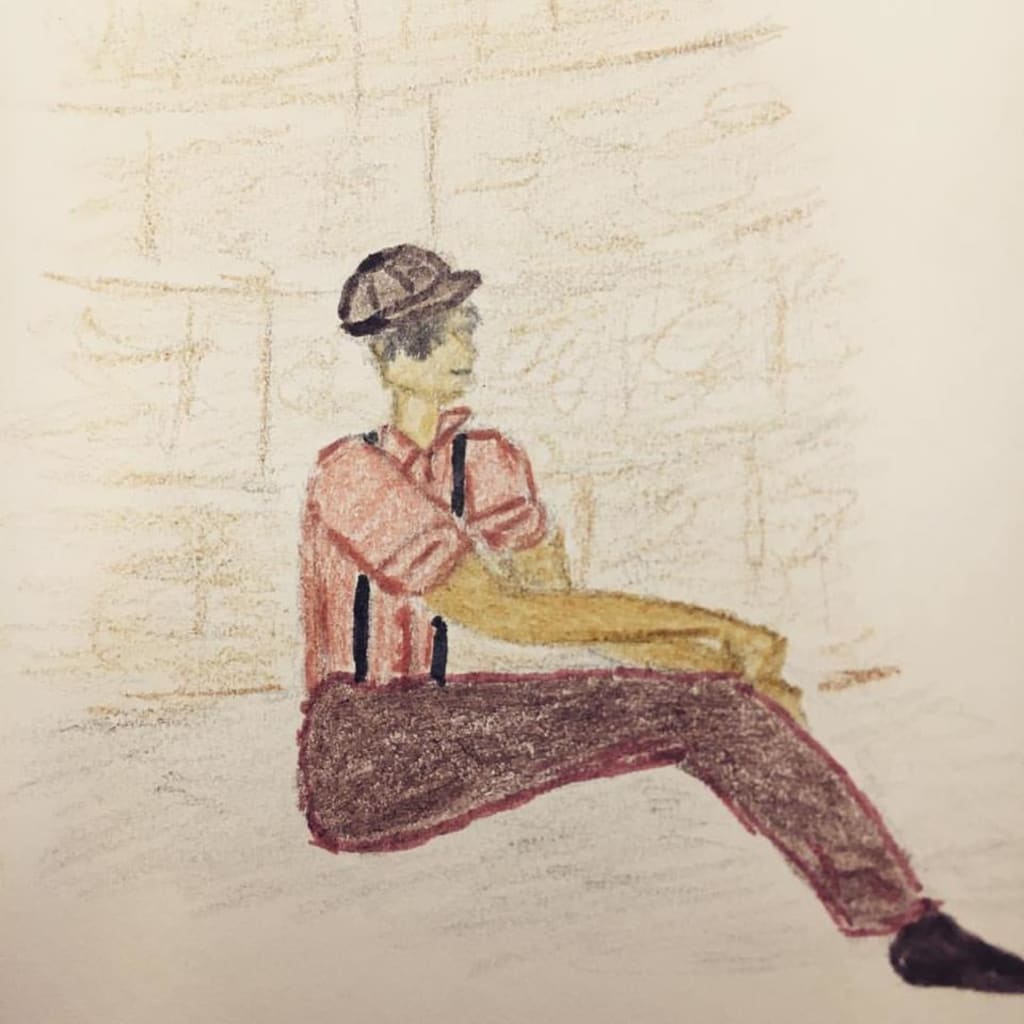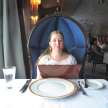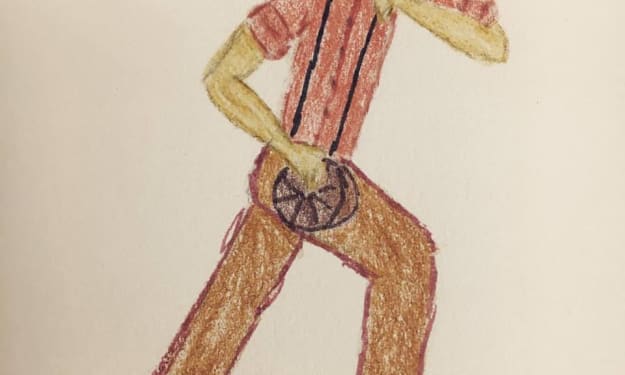Retribution: Chapter 10
The Beginning of Summer

When the rainy weather passed, days of sun and heat took their place as May turned into June.
Finding a few hours to rest between rehearsals and the performance in the evening, Adèle was lounging and reading fashion magazines in a pillow laden hammock hanging among bowers of white rose bushes.
Charles joined her outside and snuck up behind her to sniff the crown of roses that had been placed around Adèle's white sun hat.
"Hello Charles," she said to him.
"Madame Brady is coming with me to see you this evening. I was thinking that we could take her out to dinner after the show."
"I'll see how I feel later."
Charles sat down in a blue deck chair cushioned with similar black and white pillows to those this wife lounged on and began to read the newspaper.
He was particularly interested in international news, especially as to what was going on in America. The dust storms were getting worse, robbers were running rampant, and people were still poor and hungry but beer and wine had been made legal again so at least they could have a drink legally.
Adèle put down her magazine and turned her head to admire her husband. The weather was very warm but he looked cool and composed. Charles was tall with an athletic build. Unlike most men of his age, his physique and features were still hard and strong and showed no signs of becoming soft and he still had a youthful, boyish charm. His fair hair was greying at the temples but this did not make him look old. He was still a handsome man who could turn the heads of most women, even those who were young enough to be his daughter.
There was an English look about him. Adèle could imagine him out shooting in the grounds of an English estate dressed in tweeds and knits. She even fancied a resemblance to the dashing Prince of Wales.
The days were still tough for Augustin. A few hours of work here and a few francs there which quickly ran out and days of heat, hunger, little sleep, and weakness.
One day he found himself wandering around the grocery stand where he had taken the bourgeois's wallet. The grocer noticed him and shouted insults at him. Augustin quickly left, expecting the grocer to call for the police.
He pondered the names the grocer had called him: thief, punk, worthless, and wondered if that could be all there was to him.
That evening he went to visit Tante Maude and arrived as a meager dinner was being put on the table. Lèon opened the door and greeted him. Augustin kissed Tante Maude on the cheek and took a seat for dinner. Tante Maude asked him how he was doing and he gave answers calculated to not make her worry.
But making Tante Maude worry was what he did nonetheless. Memories of him being brought home by a policeman, a common occurrence in his younger days, were still fresh in her mind and she was worried about what he was up to.
Augustin knew that he had let her down many times but a disappointment could not be all that he was.
Bad as he had been, one day he hoped to make something of himself and make her proud of him. Cross his stupid heart, his would.
After watching Adèle dance in Sleeping Beauty, Charles took Sarah out to dinner. Adèle had felt tired and told them to go one without her. Over their meal, the two continued to catch up.
"Your French has become very good," she told him in English.
"I had a very good teacher," he answered in English, a thing he usually avoided because he spoke English with the remnants of a New York accent.
"When did Laurie die?" he continued.
"About two years ago of a heart attack."
They both knew that it must have been a blow to Laurie to die this way. His father had also died of a heart attack, a death brought on by years of drink and bad living. Laurie had tried his hardest not to succumb to the vices of his father but had his own struggle with drink.
"I'm sorry."
Sarah preferred to remember Laurie as the gallant and free-spirited young man she had fallen in love with as a young girl. She had been the oldest child of a poor Jewish family that had fallen on hard times after the death of her father, with more refinements and accomplishments than most girls of her station but had to give it all up to work as a maid and then as shop girl to help support her family. Laurie had not been the husband her mother would have wanted for her but despite everything their life together had been a good one.
"Any other news?"
"The Earl of St. Oswald died this winter."
"I've heard about that. I saw his son, the new Earl, at the ballet this spring. Speak of the Devil," Charles noticed a man in his mid-thirties with auburn hair past by. "Nice to see you again, My Lord."
"Likewise, Prideaux" the auburn haired man answered in French.
"Sarah, I believe you know Lord St. Oswald."
"Nice to see you here, Mrs. Brady," Lord St. Oswald said to Sarah, "and this is Matthew Chenoweth."
Lord St. Oswald gestured to his companion, another man in his mid-thirties.
Matthew Chenoweth gave them a warm smile.
"It's a pleasure," Charles said, shaking the man's hand.
"Likewise," Chenoweth answered.
After this quick greeting between acquaintances, St. Oswald and Chenoweth continued on their way.
"Matthew Chenoweth is a relative of his, their fathers were cousins," Sarah explained to Charles. "In fact, the late Earl and Countess stood as sponsors at his baptism and he grew up with St. Oswald."
Augustin spent the night at Tante Maude's like he sometimes did. His old bed in the room he had shared with Lèon was still there for him as if he had never left. Even Lèon looked little different. With his slight build and sweet youthful face, Leon looked young for his eighteen years. He whispered across the room to Augustin like he had done in the old days, asking him about Algiers.
During his early years of his life, he had lived in a little square house of white washed stone, one of the many stacked up on the hill of the Casbah. It had a doorway shaped like a keyhole and an entrance way decorated with mosaics. Steps trimmed with mosaics similar to those in the entranceway lead up to the flat roof where his grandmother kept potted plants and hung things up to dry. There had been a large window closed off by a blue curtain which looked out over the city of Algiers.
The only things he really remembered about his mother was a radiant round face like the full moon hanging over his bed surrounded by a head of springy dark curls which his infant hands had liked to pull and someone who played with him among the flowers and herbs of his grandmother's garden.
When fever came to Algiers, Augustin had fallen ill. He had been only five at the time and because the very young and the very old are the most vulnerable to epidemics, everyone had expected him to die. But for whatever reason, he lived. His mother had sat by his side nursing him the entire time but then fell prey to the fever herself. Being a healthy young woman, she had a bigger chance of survival. But for whatever reason, she died.
Grand-mère Margot had always said that we cannot always expect an explanation of why things happen the way they do.
Grand-mère Margot was a more vivid memory. She had worn a faded old apron and her silver-streaked black hair pulled back by a turban until the day she died and smelt of fragrant herbs and flowers and wet earth. Her green thumb was well known and her garden was envied for miles.
She always called him her ray of sunshine though he could not remember a time he had brought anything remotely like sunshine into anyone's life, especially hers, when it had been an illness she caught had caught from him which killed her.
Late that night, when Adèle was fast asleep, Charles went into his office and turned on the floor lamp by the bookcase. From the top of the bookcase, he took an old cigar box and brought it over to his desk.
With a key with a pewter mermaid keychain that was kept in a drawer in his desk, he opened up the cigar box. Inside were old photographs. Charles poured himself a tumbler of scotch and began to go through photographs of New York, of Laurie Brady and his family, his comrades in the army during The Great War, and periods in between. At the bottom were two photographs, one of a young girl in her early twenties standing in front of a window holding a large striped ribbon marked 1911 and the other of a baby in a baptism gown placed on a miniature sofa marked 1914.
About the Creator
Rachel Lesch
New England Native; lover of traveling, history, fashion, and culture. Student at Salem State University and an aspiring historical fiction writer.






Comments
There are no comments for this story
Be the first to respond and start the conversation.